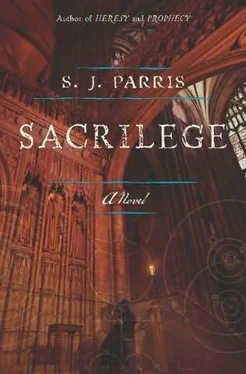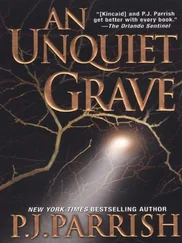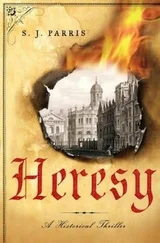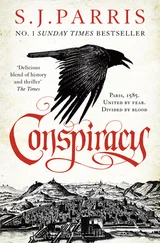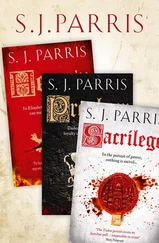I looked around. There was no one to be seen on this side of the cathedral, and I knew I must act quickly. Langworth had said that the broken window was in his back parlour, so I looked along the row of houses for any sign of an alley that would lead to the rear. There was a small path that disappeared around the crumbling arches of the priory infirmary; just as I made to follow it, a great peal of bells erupted from the tower above me, causing me to jump almost out of my skin. Catching my breath, my heart pounding in my throat, I moved as quickly as I could past the ruins and found myself facing the backyards of the row of prebendaries’ houses. These yards were no more than six feet across, separated from the path by a low wall. On the other side of the path more buildings backed onto these; I gave a quick glance to their windows, but decided I had no time to worry about who might be overlooking the treasurer’s yard. If I was lucky, everyone in the precincts would now be on their way to the service.
Emboldened by the knowledge that Langworth did not have a live-in servant, I scrambled over the wall and saw immediately the window he had complained about; its latch was broken and the weight of the leading was causing it to hang open. The casement itself, to the right of the rear door, was not large; a man like Tom Garth would not have stood a chance. Even for me it was an effort, but I was able to fold my limbs sufficiently to climb through and land, with dry throat and clammy palms, inside Langworth’s parlour.
The room was small, with a low wood-beamed ceiling, much like the inside of Harry’s house on the other side of the precincts. Little light entered from the windows facing the yard, making it all the more dingy and ominous. Langworth’s furniture was simple, austere even, like the man himself; there were no decorative touches, no ornaments. A high-backed settle of plain wood was placed near the hearth and against the right-hand wall a buffet displayed a few items of tableware, sufficient for one person; these were of silver, but unremarkable. If Langworth were siphoning funds from the cathedral treasury, he was not obviously spending them on fine living.
Where would a man like Langworth keep his most private correspondence? These old houses offered so many nooks and crannies for hiding places—loose bricks, floorboards, crevices in chimney stacks or under stairs—that I realised as I took my first step the absurdity of my ambition. The creak of the boards beneath my feet echoed through the house and I froze, listening for any telltale sign of movement. But the cathedral bells struck up another peal and after a moment I was satisfied that the house was empty.
The door of the little parlour where I had entered gave on to a narrow corridor leading to a small and basic kitchen, a staircase to the first floor, and, at the front of the house, a larger room evidently used as a library and study. Two cases of handsomely bound books stood against the wall, while a wide oak desk was placed before the windows, almost empty save for a pile of papers stacked neatly on one side with a book on top to weight them down, as well as an inkwell, penknife, and a block of sealing wax.
On my hands and knees, so that I would not be seen by anyone who happened to pass the front window, I crept over to the desk and cast my eye over the papers. Most contained columns of figures and details of expenditure on mundane items, the necessary outgoings of a cathedral community, with the occasional query in the margins. Nothing here of interest, but then I would hardly have expected him to leave any sensitive documents in plain view. There were no titles on the bookshelves to excite curiosity either; though they were fine editions, most were volumes of orthodox theology, classical literature, and approved Christian philosophy, such as you might expect to find on the shelves of any learned and pious official of the English church. Nothing contraband, nothing overtly controversial, nothing to indicate the Catholic loyalties that might tie him to Henry Howard. Here on the ground floor at least, any visitor could observe that Langworth’s personal effects were unimpeachable.
Creeping as quietly as I could manage, I climbed the stairs to the floor above. The bells had ceased and an anxious silence settled over the house, in which I imagined I could hear my own blood pulsing through my veins as I held my breath. At the top of the stairs I found myself on a small landing with only one door to my right, though directly ahead was a bare wall where it looked as if a doorway should have been. I pushed open the right-hand door into what proved to be Langworth’s bedchamber. The air held the faint musty smell that I associated with old men, but the bed was made and the floorboards swept clean. There was no other furniture save a wooden stand with a jug and bowl for washing. I looked around, feeling something was not right. The room was too small. This bedchamber must be directly above the study downstairs, so there ought to be another room on this floor over the back half of the house, above the parlour where I had come in. At some point, that room had been blocked off, the doorway plastered over.
On the back wall, beside the bed, hung a frayed tapestry depicting a lascivious version of the story of Susannah and the Elders. Though the colours were faded, the voluptuous curves of the nude bathing and the lustful eyes of the voyeurs were still lifelike enough to inspire less than virtuous thoughts. Quite a scene for the caustic treasurer to contemplate every night as he lay down to sleep, I thought, with a smile, amused by this indication of another side to him. But as I looked at the tapestry, I noticed not its design but its position, and on a sudden hunch I stepped forward and pulled it to one side. Concealed behind it was a door. I clenched my fist in triumph; this must lead to the back room which could not be accessed from the landing. Naturally, when I tried the latch, it was locked.
Over my years of travelling, in the course of which I had often found myself in the company of thieves, I had acquired a degree of skill in unfastening doors that people wanted to remain closed, but I had left my knife at the gatehouse and without it I could not begin any attempt at picking the lock. Then I remembered the penknife on Langworth’s desk downstairs; it was at least worth a try. I bolted down two at a time, forgetting all my earlier caution about soundless steps, and returned with the knife. The lock was not straightforward and it took some careful teasing with the end of the blade to discover where the key was supposed to rotate; a business made all the more difficult by the fact that my hands had begun to sweat, both from the heat and from fear of taking too long. Eventually, I found the sensitive point that triggered the lever, releasing the latch, and a wave of sweet relief washed over me; extracting the knife, I pushed open the door gently, bracing myself for some dark secret.
The room was empty. I felt my stomach lurch with disappointment, though I told myself not to be so foolish; why go to all the trouble of disguising and locking the door if there was nothing to be found? Only one wall had a window and this was covered by thick velvet drapes, so that barely any light entered. In the gloom I could make out little beyond bare boards and an empty fireplace. Yet I had a sense of apprehension, an instinct that I had stumbled upon something important, if I only had eyes to see. Something had been, and perhaps remained, hidden in this room, something Langworth did not want anyone to come across by chance.
I crossed to the fireplace; the hearth was swept clean and it was clear that no fire had been lit here for a long while. Crouching, I felt blindly inside the chimney breast—my friend John Dee used to hide caches of letters and secret books up his chimney and I wondered if Langworth had tried the same trick—but my groping was rewarded only with a cascade of soot and dried bird droppings. There appeared to be no recess inside that I could feel. I knelt to try and brush the mess away from the tiles of the hearth to conceal evidence of my search. I dared not draw back the curtains in case anyone glancing from one of the buildings behind the house should see the movement, but by now my eyes were growing used to the gloom. As I scattered the fall of soot with my fingertips, I realised that one of the earthenware tiles that formed the floor of the fireplace was loose. At its edge was a slight indentation that allowed me to slip the tips of two fingers into the gap and lift the tile; though it was heavy, it was evidently not sealed in like the others and lifted easily, with a loud scraping. I set it to one side, wiped my sweating hands on my breeches and felt inside the cavity that had been revealed. My fingers brushed the surface of a wooden box, and with little difficulty I eased this out through the opening. It was carved with a design of serpents and vines intertwined, small enough to be held between my two hands, and it was no great surprise to find it locked. After a bit of judicious probing with the penknife, the clasp sprung open. I moved to sit beneath the window, where I lifted the drape just a fraction, enough to allow a sliver of daylight to illuminate the contents.
Читать дальше
Конец ознакомительного отрывка
Купить книгу
